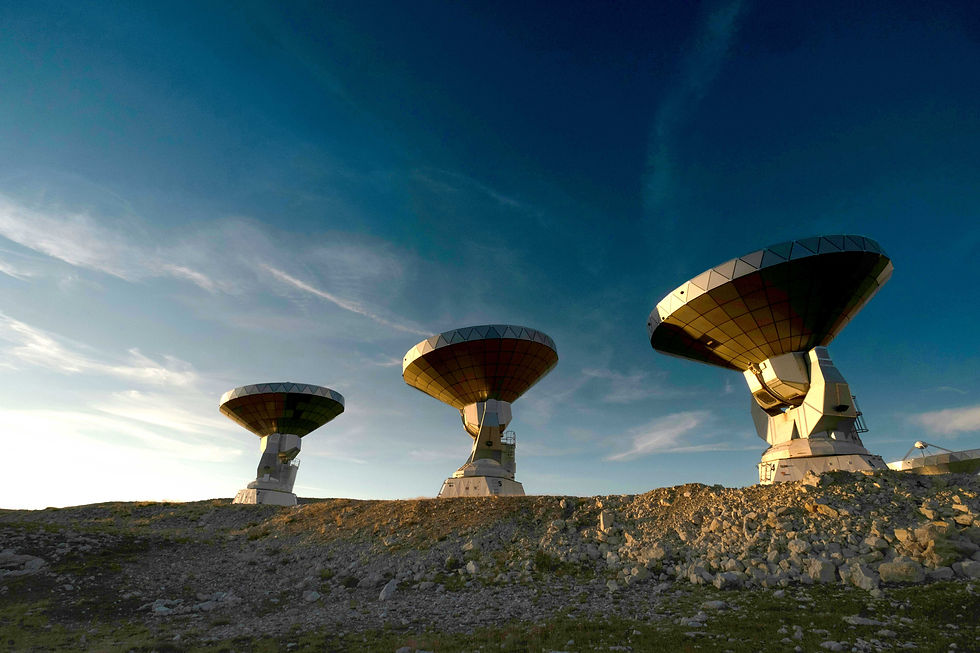Contact! Now what?
- Scott Pinkowski
- Apr 11, 2024
- 4 min read
Updated: Aug 1, 2024

First contact. It's been portrayed in countless movies and science fiction books. It's been hypothesized on by countless scientists, armchair astronomers, and even YouTube conspiracy content creators. From the moment that the public announcement is made, that we're not alone—that we're not unique, it will be safe to assume that the world will never be the same again. The potential impact of such a discovery is a topic that has intrigued people for decades. Is there any facet of humanity that will not feel the shockwaves? There will be societal, cultural, and technological impacts, for sure. Not to mention psychological implications, possible political upheaval, and philosophical hurdles to surmount.
It would be a huge undertaking to tackle all of these topics here, and probably largely unproductive, since there's virtually no empirical evidence to indicate how humanity, as a whole, will actually react. I think it's easy to imagine many will be excited by such news. It's also easy to imagine many people will be running around screaming with their hair on fire. But why worry? The odds of actually getting that radio signal from a far away star are infinitely unlikely. Right?
"Finding life or making contact is always going to be highly unlikely until the day we do it." —John Zarnecki, emeritus professor of space sciences at the Open University in the UK
So, it might not surprise you to learn that there is no formal post-detection policy openly adopted by any governmental entity in the world. I guess it's just in our human nature to put things off until the last minute. Or maybe a more kind way to say it would be, humans like to have real-life scenarios to consider before they bring new ideas into law.
There are many factors that will determine what humanity's response will be in the event of an extraterrestrial intelligence (ETI) discovery. For instance, the comprehensibility of the message. Would we even be able to decipher it at all? If so, what is the content of the message and its significance? Is the message an attempt to reach out to us, or is it the alien equivalent of I Love Lucy reruns?
What about the ETI's technological capabilities in relation to our own? Would they pose a militaristic threat? Perhaps revealing the precise location of Earth to alien civilizations isn't such a good idea, a view held by the late British theoretical physicist Stephen Hawking, who famously likened an alien visitation to Christopher Columbus first landing in America, which "didn't turn out very well for the Native Americans."
What about the lag time in signal relay, which could take generations, if not centuries if the ETI is located hundreds or even thousands of light years away? Could they have gone extinct in the time it took their message to reach us?
Setting aside for a moment the question of if we should respond at all, the aforementioned lag time in signal relay might play in humanity's favor, allowing us ample time to lay down a more solid framework for what our response should be and who should be making it.
So, what might such a framework actually look like? The International Academy of Astronautics (IAA) has attempted to devise universal guidelines on the immediate steps to be taken by a group or individual that makes a discovery. Imaginatively named the "Declaration of Principles Concerning Activities Following the Detection of Extraterrestrial Intelligence," the document has been endorsed by six international professional space societies and also serves as an informal agreement among most entities carrying out SETI. However, the set of nine post-detection protocols doesn't carry the force of law or any other regulatory power and can be ignored by public or private institutions without any legal repercussions. It's possible that, should the need arise, these protocols could be the starting point for coming up with a more binding, internationally accepted plan.
Assuming that an ETI discovery is immediately made public, (and not kept secret or monopolized by a nation in an attempt to gain political advantage), it's probable that the organizations in charge will be keeping a close watch on societal impact, how the media is handling information, the impact on religious and belief systems, and much more. The expertise needed will be vast and specialized, almost certainly an international team of experts. They'd need to draw up plans for every possible scenario we, as humans, can imagine, and hopefully, all of this will be done in a transparent manner.
Another objective might be to get the UN involved, probably the only global body with the ability and influence to oversee humanity's handling of an ETI message and our response (although action and debate would depend on the will of the member states). Again, the distances between stars mean that any conversations we have with E.T. could take centuries, so we'd have to make sure that our plan has the resources and flexibility to progress along with humanity, itself.
One of the more urgent concerns may be to establish international agreements to prevent individuals with the capability or private corporations from responding on their own. We wouldn't want little Jimmy tinkering with his ham radio talking to E.T. before a consensus has formed on whether or not it's safe to respond at all. Nor would we want Walmart or Disney to respond on behalf of the whole planet.
Perhaps we're lucky to have the luxury to just be speculating on these topics. A day may come—maybe tomorrow—that we'll find ourselves scrambling to respond to one of the biggest scientific discoveries in our planet's history.






Comments